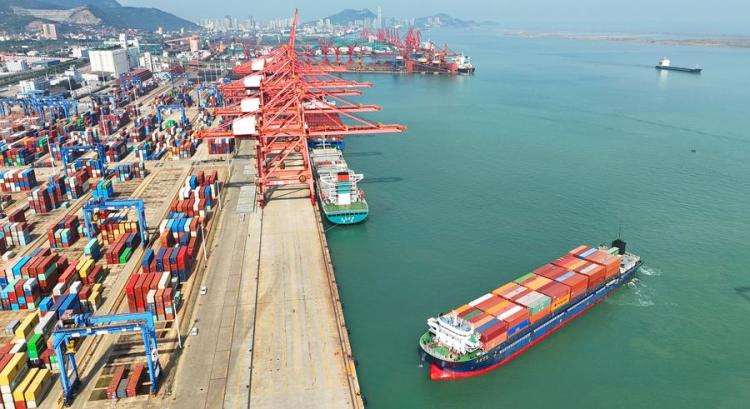
This aerial drone photo taken on May 9, 2024 shows a freight ship docking the container terminal at Lianyungang Port, east China's Jiangsu Province. (Photo by Geng Yuhe/Xinhua)
y Ian J. Marshall
The third plenary session of the 20th Central Committee of the Communist Party of China (CPC) held last month has set the stage for significant policy developments that are poised to reshape China's approach to governance, economic growth, and international relations.
With a focus on over 300 proposed policies aimed at enhancing economic resilience, social equity, and environmental sustainability, this session presents a unique opportunity for developing countries and economies to engage, support, and benefit from China's evolving landscape.
Here are the key insights from the Third Plenary Session in 2024:
1. High-Quality Economic Development: A shift from rapid growth to a focus on high-quality development was emphasized. This includes enhancing productivity, fostering innovation, and improving the efficiency of resource utilization.
2. Technological Innovation and Digital Economy: The session underscored the commitment to fostering technological advancements, particularly in the digital economy, artificial intelligence, and green technologies.
3. Sustainable Development Goals: There was a strong commitment to achieving environmental sustainability, aligning with global climate change initiatives and promoting a circular economy.
4. Social Welfare and Equity: Policies aimed at improving social equity, healthcare access, and educational opportunities were prioritized, aiming to reduce disparities and enhance the overall quality of life for all citizens.
5. International Cooperation: The CPC expressed a desire to deepen international partnerships, particularly with developing countries, to create a more interconnected global economy.
-- Opportunities for Developing Countries
The policies proposed during the plenary session present a myriad of opportunities for developing nations:
1. Access to Technology and Innovation: With China's emphasis on technological advancement, developing countries can benefit from partnerships in technology transfer. Collaborations in sectors such as renewable energy, information technology, and biotechnology can help these nations leapfrog traditional development barriers.
2. Infrastructure Development: The focus on high-quality development can lead to increased investments in infrastructure projects. Developing countries can attract Chinese investment by aligning their infrastructure needs with the Belt and Road Initiative (BRI), and facilitating transport, energy, and connectivity projects that promote economic growth and regional integration.
3. Enhanced Trade Relations: As China diversifies its economic focus, developing countries can explore new trade opportunities. By understanding China's changing demand for goods and services, these nations can position their exports accordingly, tapping into the vast Chinese market.
4. Capacity Building: The emphasis on social equity and education opens avenues for capacity-building initiatives. Developing countries can engage in educational exchanges, vocational training programs, and skill development projects in collaboration with China to strengthen their human capital, improve job prospects, and enhance overall social development.
5. Collaborative Environmental Solutions: The commitment to sustainability offers a platform for developing countries to collaborate with China on environmental initiatives. Joint projects focused on climate change mitigation and adaptation can enhance resilience and promote sustainable practices.
-- Strategic Engagement for Mutual Benefit
To effectively leverage the opportunities presented by the plenary session, developing countries should consider the following strategic approaches:
1. Alignment of Development Goals: Align national development strategies with the priorities outlined in China's policies. By doing so, they can create synergies and foster cooperative projects that benefit both parties.
2. Bilateral and Multilateral Agreements: Formulate agreements that promote trade, investment, and technology exchange. Developing countries should advocate for equitable terms that ensure mutual benefits while addressing their unique needs.
3. Inclusive Stakeholder Engagement: Involve local communities, businesses, and civil society in the development and implementation of partnership projects. This inclusive approach ensures that projects are relevant, sustainable, and beneficial to the local population.
4. Focus on Human Capital Development: Prioritize education and skill development initiatives that can enhance local workforce capabilities. Engaging with Chinese institutions for training and knowledge-sharing programs can build a stronger foundation for future growth.
5. Monitoring and Evaluation Frameworks: Establish mechanisms for assessing the outcomes of cooperative initiatives. Continuous evaluation can help identify best practices, address challenges, and adapt strategies for greater impact.
The Third Plenary Session of the 20th CPC Central Committee in 2024 heralds a transformative period for China and its international relations, particularly with developing countries. By understanding the proposed reforms and engaging strategically with them, these nations have the potential to unlock a wealth of opportunities for economic growth, technological advancement, and social progress.
As the global landscape continues to evolve, fostering cooperative relationships with China will be essential for achieving shared goals and addressing the complex challenges of the 21st century. Through embracing collaboration and innovation, developing countries can position themselves to thrive in an interconnected world.
Editor's note: Ian J. Marshall is Ambassador Extraordinary and Plenipotentiary of Grenada to China.
The views expressed in this article are those of the author's and do not necessarily reflect the positions of Xinhua News Agency.
编辑:袁筱